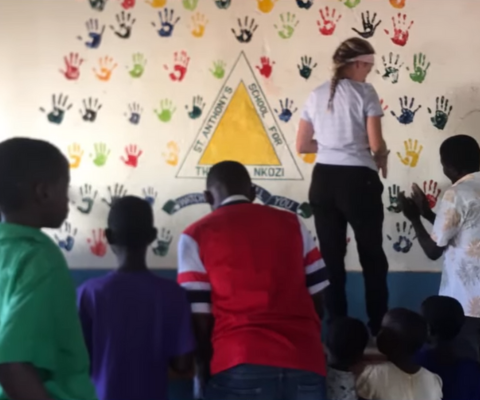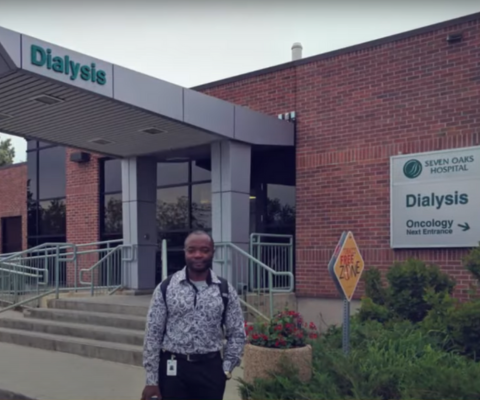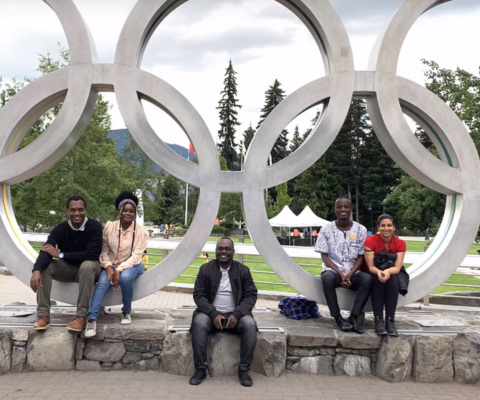Unexpected aspects of studying abroad
Text on screen: [Queen Elizabeth Scholars logo]
Text on screen: [Unexpected aspects of international experience]
Jeremy Wagner, University of the Fraser Valley:
When I was going to Tanzania, it was a foreign place for me initially, and I was anticipating dealing with foreign issues, but I found when I was there was that many of the issues that I was engaging with were very relatable within the Canadian context. I think that goes to show how interconnected issues are and how important it is to work internationally with, with partnered organizations in addressing these sorts of issues.
Trilby Buck, University of Victoria:
I went over there, expected okay, I’m going to feel like this, this and this, and it didn’t ever happen the way that I expected it to. There was lots of frustration and questions and writing things down frantically, trying to make sense of it all. And when I came back, it wasn’t until I really talked to someone about it that I was able to realize, and they said well, that sounds a lot like culture shock. And I said, oh my God, it did happen, it just happened in such a way that I had no idea.
Oduro Oppong-Nkrumah, McGill University:
Before I came here, I had the impression Canada was a very homogeneous society. I came here and realized that it is probably far more diverse than I ever imagined it could be. And I’m also quite intrigued by how that diversity is handled, how it’s celebrated, acknowledged and is treated as a fundamental part of the society. I think that has been very fascinating for me.
Claudia Bojanowski, Université de Montréal:
En fait, l’Inde en général, c’est vraiment un milieu riche en expérience. C’est totalement différent. Il y a tellement de gens, il y a tellement de diversité, de détails, de couleurs, de langues et différents langages. On change de ville, différentes religions, différentes traditions. Aussi des gens de justement, d’avoir développé cette plateforme-là et surtout c’est des gens en fait, qui sont spécialisés dans une technologie de communication et qui ont pas nécessairement de l’ex-, pas d’expérience mais une formation en santé. Mais pourtant, les enjeux de santé étaient, il y a une compréhension tellement incroyable des enjeux de santé, des enjeux éthiques. Donc, j’ai tellement appris et je voyais aussi l’interdisciplinarité, comment ça peut, ça enrichit, dans le fond, toute intervention.
Ahmad Firas Khalid, McMaster University:
On the flight, I was, like, you know, I know everything. I’m at the PhD level, I have three other post-graduate degrees, I’ll be good. And I’ll be very frank, within 48 hours of my internship, I got really truly humble, because the amount of knowledge and the experiences that people around you have and the idea that there’s so many more to learn in life, that it’s not as simple as you think, that there is multifaceted approach to many different problems. For me, that’s one of the things I will always reflect on. It’s sort of engraved in my head now. I had the privilege of traveling as also a Queen Elizabeth Scholar to Johannesburg and seeing the social enterprise that’s going on in communities, and the importance of community involvement and engagement. That’s another lesson I didn’t know before doing this Queen Elizabeth Scholarship.
Text on screen: [http://www.queenelizabethscholars.ca/ #qescholars, Logos of Universities Canada, Community Foundations of Canada and Rideau Hall Foundation]
Queen Elizabeth Scholars discuss the unexpected surprises and challenges they faced while working internationally, and share how these surprises changed their outlook on the world.
*In the video and its transcription, French and English are used alternately.
Tagged: Global connections, Study abroad




